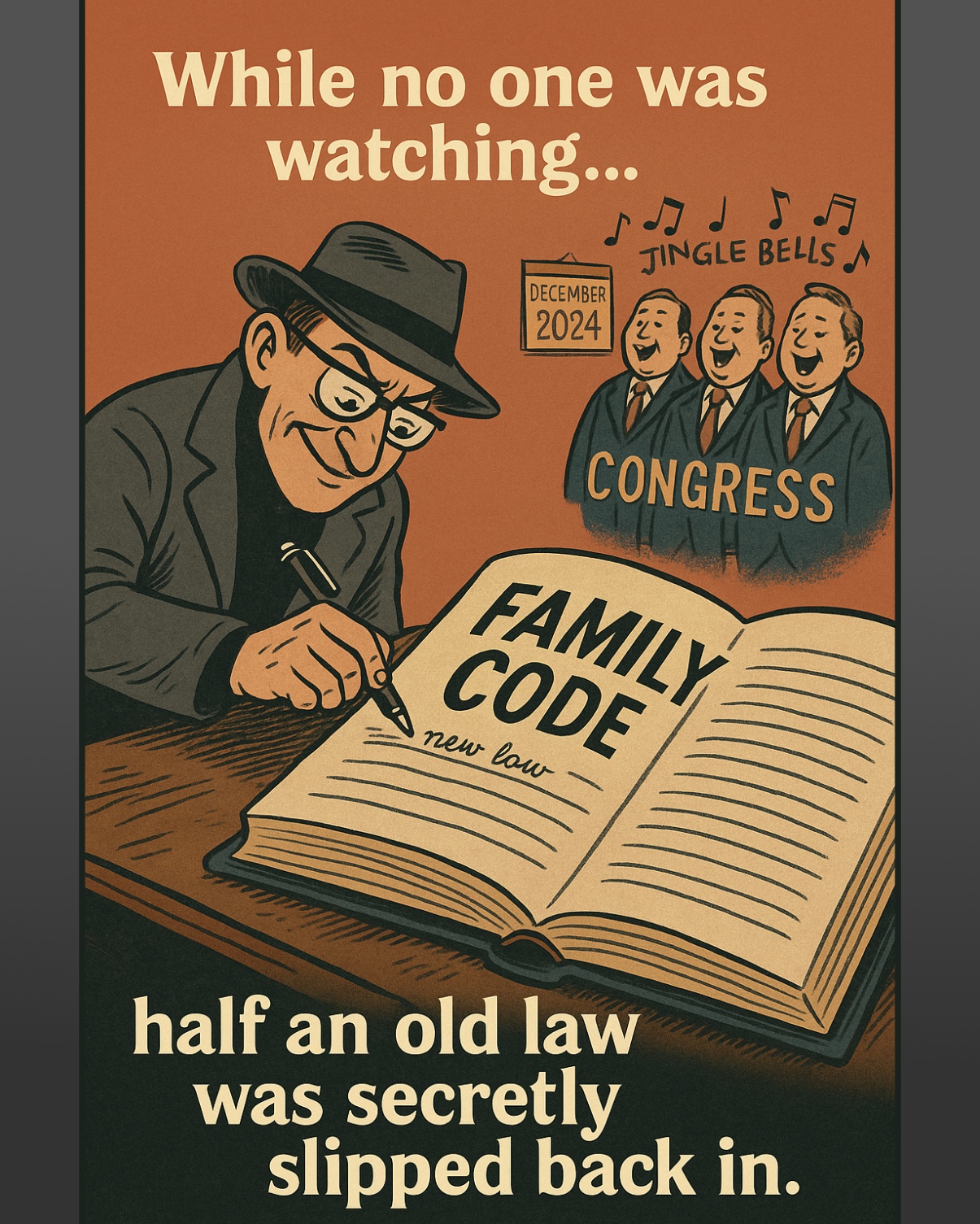Tender-age wasn’t preserved lawfully — it was cherry-picked out of an old code, stripped of its true meaning, and quietly slipped into custody practice without Congress ever approving it.
See what the real Family Code says. 📜 #Justice4Adri
📜 The Truth About Tender-Age Doctrine: Justice4Adri Exposes the Legal Myth
For decades, many Filipino families — and even government offices — have wrongly believed in the so-called “tender-age doctrine”:
the idea that mothers automatically win custody of children under 7 years old.
⚠️
Today, we expose the truth:
Tender-age is not codified law.
It is a misunderstood and misapplied idea.
Here’s what the official record actually shows:
🏛️ 1. 1949 Civil Code (RA 386) — The True Original Law
- Article 363 says:“In all questions on the care, custody, education and property of children, the latter’s welfare shall be paramount.”
- Only after establishing child welfare as the supreme rule does it add:“No mother shall be separated from her child under seven years of age, unless the court finds compelling reasons.”
✅ Tender-age was never an automatic rule.
✅ The child’s welfare was always supreme, overriding parental preferences.
🏛️ 2. 1987 Family Code (EO 209) — Tender-Age Not Carried Forward
When the Family Code was enacted in 1987:
- The Code was completely rewritten and reorganized.
- Article 213 requires that the court assign custody, considering “all relevant factors,” especially the preference of children over 7 years old.
- There is no reference anywhere to tender-age in the Family Code.
✅ Tender-age was not carried forward into the 1987 Family Code.
✅ Custody decisions must now follow due process and judicial findings — not automatic assumptions based on a child’s age.
🏛️ 3. Father’s Authority During Parental Disagreements
- Article 311 (RA 386, 1949) stated:”The father and mother jointly exercise parental authority… In case of disagreement, the father’s decision shall prevail, unless there is a judicial order to the contrary.”
- Article 211 (EO 209, 1987) reaffirmed:”In case of disagreement, the father’s decision shall prevail, unless a court rules otherwise.”
✅ The father’s decision lawfully prevails during parental disagreements.
✅ He may protect the child’s welfare by limiting an irresponsible parent’s access if necessary — without needing prior court permission.
✅ A judicial order is necessary only to override the father’s prevailing authority — not to validate it.
🚨 4. The Modern “Tender-Age Doctrine” Is a Misapplication
- Many barangays, DSWD officers, and police wrongly apply “tender-age” as if it were codified law.
- They unlawfully assume that the mother automatically gains custody of children under 7 — without court process, without evidence, and without lawful basis.
- In reality, only courts can modify custody rights — and decisions must prioritize child welfare first, not parental myths.
🧨 5. Official Evidence of Unauthorized Alterations
- The Official Gazette of the Philippine Government (officialgazette.gov.ph) —
the only official source for Philippine laws — does not contain any “tender-age” language under Article 213 of the Family Code (EO 209, s.1987). - Meanwhile, third-party sites such as Lawphil.net —
originally published tender-age-free versions —
altered their texts between October 8, 2024, and February 7, 2025 (confirmed by Wayback Machine archives)
— inserting “tender-age” phrasing without any official congressional amendment. - Some attorneys today, notably PAO attorneys, are found relying on reprinted Family Code books from the 2000s that illegally blend a cherry-picked line without full context from Article 363, RA 386 —
despite no lawful authorization to do so. - Photographic comparisons between the Official Gazette’s version and altered versions from private legal publishers show clear discrepancies —
with no official congressional act authorizing the insertion of tender-age references.
✅ This proves that what many are citing as “tender-age law” is unauthorized, unofficial, and illegal under Philippine statutory law.
⚖️ Justice4Adri Stands For:
✅ Child’s welfare first — always.
✅ Due process and lawful parental authority — not fabricated customs.
✅ Exposing unauthorized manipulations of family law.
✅ Defending children and families through real law, not cultural shortcuts.
🧨 Bring back lawful custody decisions.
🧨 Protect children through true law — not corrupted myths.
🧨 Defend real parental responsibility under real statutes.
📢 #Justice4Adri
📢 #FamilyCodeTruth
📢 #ChildWelfareFirst
📢 #StopCherryPickingLaw
📢 #DueProcessForParents

